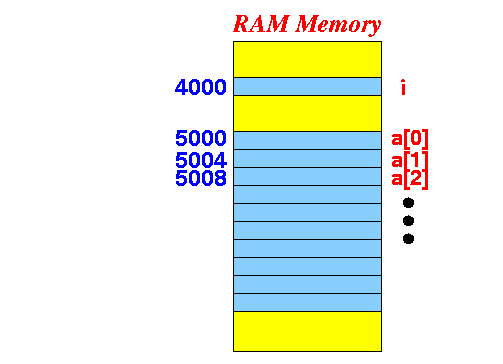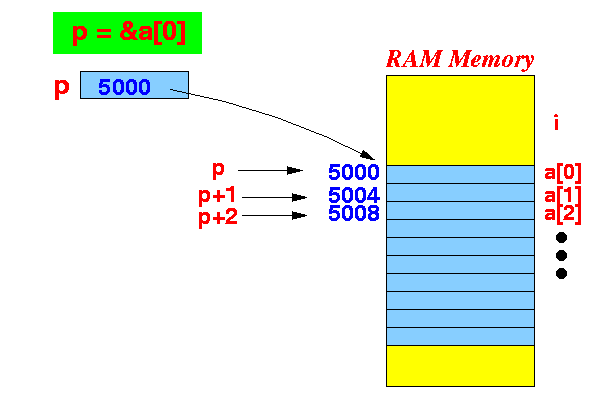- Recall that:
int i; // An integer variable int a[10]; // An integer array int *p; // A reference variable to an int variable // p can contain an address of an int variable
- Consider these 2 kinds of
int variables:
int i; // An integer variable int a[10]; // An integer arrayIllustrated:

Notice that:
- i is an int typed variable
- a[0] is an int typed variable
- a[1] is an int typed variable
- And so on...
- Therefore, we can use an
int *p variable to access
any one of these
int typed variables:
int *p; p = &i; *p will access i p = &a[0]; *p will access a[0] p = &a[1]; *p will access a[1]
- Important fact about
pointer/reference variables:
- A reference/pointer variable
always has
an associated data type:
Example:
int *p; // p must point to an int typed variable float *q; // q must point to an float typed variable
- A reference/pointer variable
always has
an associated data type:
-
Pointer addition:
what does it mean to
add an
integer to
a pointer value
- The expression:
referenceVariable + integerevaluates (returns) to the address
referenceVariable + integer*sizeof( (*referenceVariable) )
Comment:
- If you remember the lecture on how to access array elements in assembler code ( click here), then you should already understand what adding an integer to a pointer value achieves.
- The expression:
- Example:
- Initially, the variable p
points to the variable a[0]:
int a[10]; int *p; p = &a[0];
- Then the expression
p + 1 will
evaluates to:
p + 1 ===> &a[0] + 1*sizeof( (*p) ) // (*p) is an int ! <===> &a[0] + 1*4 <===> &a[0] + 4 - The expression
p + 2 will
evaluates to:
p + 2 ===> &a[0] + 1*sizeof( (*p) ) // (*p) is an int ! <===> &a[0] + 2*4 <===> &a[0] + 8
Example C progra:
int main(int argc, char *argv[]) { int a[10]; int *p; p = &a[0]; // p points to variable a[0] printf("p = %u, &a[%d] = %u\n", p, 0, &a[0] ); printf("p + 1 = %u, &a[%d] = %u\n", p+1, 1, &a[1] ); printf("p + 2 = %u, &a[%d] = %u\n", p+2, 2, &a[2] ); printf("p + 3 = %u, &a[%d] = %u\n", p+3, 3, &a[3] ); }Output of C program:
p = 4290769444, &a[0] = 4290769444 (increased by 4 !!!) p + 1 = 4290769448, &a[1] = 4290769448 p + 2 = 4290769452, &a[2] = 4290769452 p + 3 = 4290769456, &a[3] = 4290769456
- Initially, the variable p
points to the variable a[0]:
- Example Program:
(Demo above code)

- Prog file: click here
How to run the program:
- Right click on link(s) and
save in a scratch directory
- To compile: gcc pointer-arithm1.c
- To run: ./a.out
- The following figure
shows the
result of the
p+1
and p+2 more
clearly:

In other words:
If p points to a[0] then: p + 1 = &a[0] + 4 = the address of the array element a[1] !! p + 2 = &a[0] + 8 = the address of the array element a[2] !!
- In general:
- The expression:
p + xevaluates to:
- the address of the xth array element following the array element that is pointed to by p !!
- The expression:
- The − operator
on reference variables has a
similar effect as the
+ operator:
- Suppose, the variable p
points to the variable a[5]:
int a[10]; int *p; p = &a[5];
- Then the expression
p - 1 will
evaluates to:
p - 1 ===> &a[5] - 1*sizeof( (*p) ) // (*p) is an int ! <===> &a[5] - 1*4 <===> &a[5] - 4 - The expression
p - 2 will
evaluates to:
p - 2 ===> &a[5] - 1*sizeof( (*p) ) // (*p) is an int ! <===> &a[5] - 2*4 <===> &a[5] - 8
In other words:
If p points to a[5] then: p - 1 = &a[5] - 4 = the address of the array element a[4] !! p - 2 = &a[5] - 8 = the address of the array element a[3] !!
- Suppose, the variable p
points to the variable a[5]:
- In general:
- The expression:
p - xevaluates to:
- the address of the xth array element prior to the array element that is pointed to by p !!
- The expression: